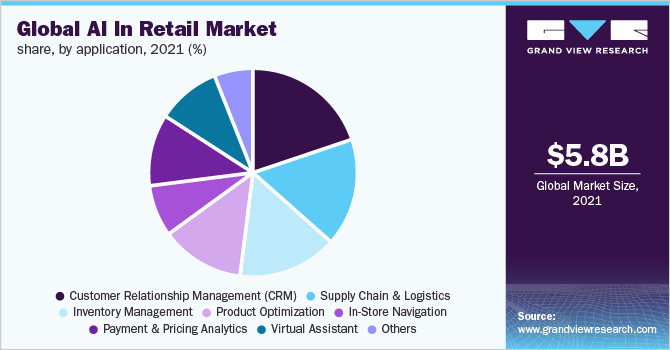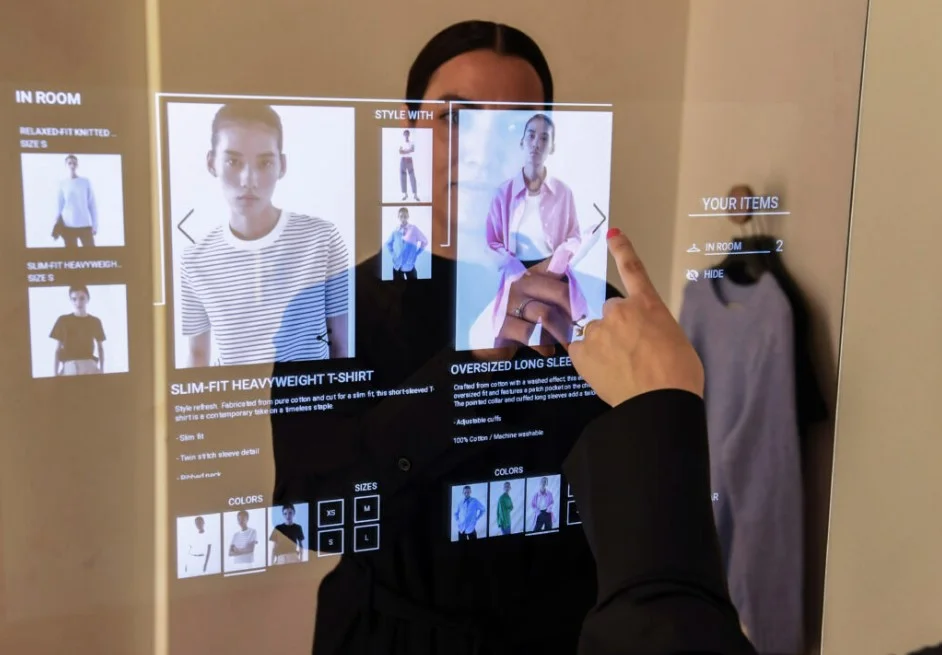Artificial Intelligence (AI) excites people across the world. While you might think of AI in terms of sci-fi stories, recent developments such as ChatGPT have ensured that the near future will be dominated by AI technologies - and the retail industry will be at the forefront of this revolution.
AI technologies use algorithms to mirror the intelligence processes of humans. This means that AI can be used to produce sophisticated analyses of large datasets, respond to questions by humans, and automate a huge range of repetitive tasks.
Just as the internet has made the idea of retail without ecommerce impossible to imagine, it will surely not be long before AI has transformed every element of the retail industry. Whether you focus on brick-and-mortar stores or ecommerce transactions, you can start to integrate AI into your operations today.
This article will highlight the benefits of using AI in retail and guide you through some of the technologies and solutions that will let you make the most of AI in retail.
How Can AI Benefit Retailers?
Whether it's using online chatbots or managing inventory, you’ve probably already seen some of the benefits offered by AI-powered technology. While many of these are relevant to all industries, here are some of the main benefits of AI for retailers:
Improved Customer Experience
If your customers have a great experience shopping with you, nothing will stop your business from growing. AI has the potential to create a truly personalized, optimized, and seamless customer experience.
AI-powered technology can track individual customers and analyze their interests and purchases, allowing you to provide offers that are unique to each customer and perfectly suited to their interests and requirements. This personalization is a great way to make your customers feel special.
As well as this, you can use chatbots or virtual receptionist to provide personal and immediate responses to customer questions. This works to streamline customer service, signposting customers to the resources that can best help them.
Improve Customer Experience
With interactive content
Better Decision-making
AI is the perfect technology for analyzing large datasets and producing effective and accurate conclusions. This will result in enhanced decision-making capabilities on your part.
This could include using AI to analyze advertising statistics in order to choose where to focus your marketing budget. Alternatively, you could use AI to forecast when demand for certain products will change, allowing you to optimize your investments and stock management going forward.
You might think that you already have the skills to make these decisions - but AI will make sure that your decision-making will be grounded in masses of data, improving its efficiency.
Optimized Prices
Similarly, AI can efficiently analyze how different price points will affect the likelihood of customers purchasing your products.
By leveraging AI technologies for product pricing, you can consider a far wider range of data than most humans, taking into account years of historical price data, the range of different prices from across the world, and predictive analytics.
With prices determining the size of your customer base as well as your profit margins, using AI to find a perfectly-optimized price range is a crucial way to grow your retail business.
Efficient Supply Chain Management
Many retail companies have struggled to effectively manage their supply chains, especially since the disruptions caused by Covid-19. With supply chains often spanning the world and involving numerous different suppliers and shipping companies, AI-powered technology is a great way to stay on top of this complex part of your business.
AI can study a range of possible suppliers to find the one that’s best suited to your needs. Also, it can identify where disruptions are likely to occur, meaning that you can protect yourself against potential supply chain interruptions.
Better Understanding of Your Audience
Another way that AI can be used by retailers is to provide a better understanding of your audience. By setting up an algorithm to analyze your potential customer base, you’ll be able to identify the characteristics and interests that define your audience.

This automated segmentation is much quicker and more accurate than market research that is conducted by human employees, allowing you to more effectively use targeted marketing strategies.
Fewer Human Errors
Imagine the significant amount of time you spend at work on mundane and repetitive tasks. These not only divert your skilled employees from focusing on critical aspects of your retail business but also expose them to the risk of human error.
This isn’t only about the most basic tasks. You can also leverage AI technology when doing more complex work, such as mobile software testing, to make sure that your business is protected against human error.
Automating these tasks through machine learning technology will mean that you can be confident that processes such as data entry will be absolutely accurate, while also allowing your employees to focus on more productive work.
What Does AI in Retail Look Like?
It’s obvious that AI can benefit your retail business by providing a wide range of solutions. However, it can be difficult to know how exactly you can use AI-powered technologies in your own company. Here are some of the emerging AI solutions that are most relevant in the retail industry:
Predictive Analytics
Predictive analytics is machine learning that uses data analysis to predict future trends. Using predictive analytics software will allow you to optimize prices in the future and organize supply chains. H&M, a prominent player in the retail industry, serves as a prime example of using AI to accurately anticipate stock replenishment needs.

Chatbots
AI can also be used to make incredibly sophisticated chatbots. These can be integrated into your website, allowing your company to speedily respond to customer queries and manage processes such as returns. If customers have more complex queries, the chatbot can guide them to speak to a human, perhaps using virtual business phone systems from Vonage or directing them to an email address.
Virtual Assistants
Similar to chatbots, virtual assistants such as Alexa use AI to provide the best service. You should learn how to optimize your online business so that customers can order your products through these virtual assistants. As well as this, you can use AI assistants to manage your business operations.
Inventory Management
Algorithms that automatically monitor inventory management - used alongside AI predictions about future demand - can keep items in stock while ensuring that you’ll be unlikely to keep too much stock. Companies such as Zara have already started using AI to optimize their inventory management.
AI can be leveraged to improve logistics and shipment tracking by integrating proof of delivery systems. This helps retailers track the status of deliveries in real-time, providing transparency and reducing disputes or errors.
Personalized Marketing
AI analysis of customer data will allow your customers to receive up-to-date and personalized product recommendations. If you want to focus on finding complementary products for customers, you should look for AI solutions that provide collaborative filtering.
Alternatively, you can use content-based filtering machine learning technology to make sure that customers receive recommendations that are in their size or favorite colors. Natural language processing allows AI systems to analyze written feedback by customers so that you can better understand their preferences and interests.
Create Product Recommendation Quiz
Start with a template code free
Fraud Detection
One of the most transformative features of AI technology is the ability to analyze large amounts of data quickly and efficiently. By being able to look for patterns in purchase data, AI can help you to detect fraudulent activity.
This might include recognizing purchases that take place at suspicious times or that are unusually high-value, protecting your retail company against potentially fraudulent scams.
You can also use AI to protect your customers from this activity. Walmart has started to use AI analysis of customer data to detect when stolen credit cards are suspected to be used in purchases.
Product Descriptions and Marketing
Producing effective product descriptions and content marketing can make or break a retail company. While AI tools such as ChatGPT might not be ready just yet to replace your marketing department, they can speed up the process of writing product descriptions or content for advertising.
A great way to do this is by providing these AI tools with as much information about a product as possible and asking them to write a product description aimed at your specific audience. The results can then be edited by your marketing team so that any errors are identified and removed.
AI: The Future of Retail
There’s no doubt that AI is going to completely transform how retail companies do business over the next decade. Machine learning can already be used to automate a range of repetitive tasks, produce sophisticated analyses of large datasets, and respond to customer queries through chatbots and virtual assistants.
This produces benefits such as improved customer experience, better decision-making, and fewer human errors. Your retail business can make the most of these benefits by using technologies such as predictive analytics, chatbots, and inventory management.















